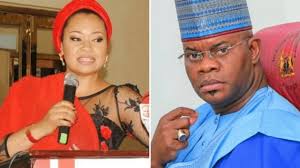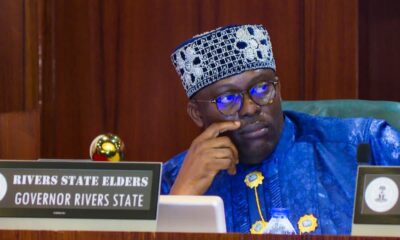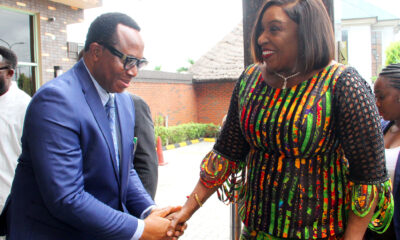Sports
Harnessing Nigeria’s Sports Potential
To many observers
within and outside the country, Nigeria is a nation endowed with so much human and material resources that it ordinarily ought to rank among the best in several sectors of human endeavour in the comity of World nations.
This is, arguably more true in the sports sector in which, with over 120 million people, Nigeria should rub shoulders with the best sporting countries and achievements that there are available.
Indeed, the potentials to achieve such lofty heights abound. From the king of them all, football, to boxing weightlifting, athletics, cycling, team sports and others, the country certainly does not lack in manpower, talents and potentials.
However, sports development in the country has yet to take the sector to the expected level. Despite the fact that sports at the moment remain the only true unifying factor in Nigeria, the sector has continued to witness serious hiccups, especially, in areas of management and policy implementation.
From the evolution of sports as physical and social activities that people freely engaged in, it has permeated the Nigerian society just as it was in many other societies worldwide. Sports development in Nigeria has witnessed a lot of metamorphosis from the colonial pre-independence to post independence eras that it has gone from being just a social phenomenon, entertainment and recreational pasttime to becoming a visible and prominent business phenomenon that could no more be ignored in the socio-political and economic environment of any nation.
Sports touch the hearts of millions of people. They promote national unity and image. An efficient sports system is expected to assist in nation building, provide youth empowerment, wealth creation, employment generation, good health and social mobilisation.
Expectations are that Sports development would contribute to the growth and development of the Nigerian economy, while the overall objective of sports in Nigeria is to become one of the 20 best sporting nation of the world.
A cursory look into the progress made by the sector in 54 years, post independence, would reveal some pockets of positive returns but deep rooted anomaly that has tended to put the march to realising the overall objective on an unwavering leash.
In the recent past, sports in the country have had a mixed-grill of exciting memories and disheartening experiences. While football has consistently kept the country in the map of world achievements, athletics blazed the trail in decades past and need new efforts to be rekindled. At the last Olympics, London 2012 Games, Nigeria performed abysmally when she failed to win any medal, only for the paralympians to, barely three weeks after, raise the profile to 13 medals, six gold, five silver and two bronze.
Also in 2012, the highest number of participants ever in the history of the National Sports Festival, NSF was recorded at the 18th edition, Eko 2012, when 11,045 athletes and officials from all the 36 states and the FCT participated.
In football, the Super Eagles won the 2013 African Cup of Nations held in South Africa to mark the third time Nigeria would rule Africa in the game. The U-20 women national team, Falconets also made the nation proud when they made it to the final of the FIFA U-20 Women World Cup in Germany in 2010, a feat the team repeated a couple of months ago in Canada.
The National U-17 male team, Golden Eaglets after a lull in winning laurels won silver in the 2013 African U-17 championships in Algeria only to conquer the world at the World Cup in United Arab Emirates a couple of months later to secure an unprecedented fourth U-17 world title for Nigeria. At the 2012 World chess Olympiad in Turkey, Nigeria won gold and silver medals, while she finished third position at the 2012 Senior African Wresting championship in Morocco.
These few milestones indicate slight improvement in the stock of sports in the country since the disappointing performance at the 2012 London Olympics.
Indeed, time was when the country was the continent’s leading light in athletics, especially, the sprints, youth soccer, boxing and weightlifting. Unfortunately, the lead position in the areas were lost to poor foresight, lack of planning and executive of policies.
However, the administration of President Goodluck Jonathan took steps to improve Nigeria’s performance in sports, when a Presidential Sports Sector Retreat was held, and a strategic and sustainable sports development and funding plan was fashioned out, to raise a pool of talents and to put Nigeria back on the global sports map. New strategic management activities, which included capacity building and early talent detection to enhance qualitative performance were also introduced.
The new strategic management activities for qualitative performance and mass participation include the capacity building of coaches and administrators, early talent detection and development, policy direction on partnership and collaboration, sports facilities maintenance, central national sports programmes, and national performance monitoring and evaluation.
Also, more forms of competitive sports have been introduced and facilities have continued to be improved and expanded both at the federal and state levels. In addition, the idea of a zonal network of federal stadia has been accepted, with locations in Kaduna, Lagos, Enugu and Abuja.
But the developmental progress has not matched the huge potentials inherent in the country. Regrettably, a myriad of factors, chief of which are maladministration, corruption, lack of professionals in key managerial positions, policy summersaults, selfishness, poor maintenance culture and absence of a conscious effort to institute global best practices in managing the sub sectors and athletes, have combined to hold down development in the sector. The recent crisis in the Nigeria Football Federation, NFF is an apt pointer to the malady in the country’s sports sector.
Undoubtedly, Nigeria boasts all the endowment to take sports to the highest point of development and achievement. It is a belief shared by renowned sports administrator, coach, one of the Icons of Nigeria’s efforts at re-inventing the sports sector and a university Don, Dr. Ken Anugweje.
He, however, is of the opinion that Nigeria has not taken advantage of her potentials and has been left behind by current top sporting nations of the world. According to him, the country failed to move with the time and continued to do the same thing the same way it has been over the decades.
The Doctor, who has contributed to turning the University of Port Harcourt into the leading University in sports in West Africa said that until conscious efforts are made to focus on school sports, early talent discovery and weaning, the county would continue to lag behind. Also, sports academies under big sports institutions with clear cut policy on personnel, catch-them-young approach and up to date data keeping and athlete monitoring would go a long way to taking the country a step closer to expectation.
The first and only Nigerian to win an individual Olympic gold medal, Chioma Ajunwa is of the opinion that Nigeria’s performances in sports in recent times have declined drastically and that the need to reposition it in line with world best practices cannot be over-emphasised.
She believes that the sector has been poorly managed by the wrong hands and so advocates that people with expertise should be allowed to manage sports in order to turn the potentials into results.
“There is need to professionalise sports in Nigeria, and its subsequent removal from the mainstream of civil service. People with expertise, both athletes and managers should be allowed to come in and manage sports. The government in making sports policies, should see the sector as a specialised filed where only the experts should prevail”, said Ajunwa.
For former triple jumper, Mr J. J. Kio, sustained competitions at the grassroots level, especially, the primary and secondary schools would continue to throw up quality talents that would sustain the supply chain for top national and international athletes that will keep Nigeria at the level her abundant endowment deserves.
The Secretary of club owners in Nigeria, Mr. Alloy Chukwuemeka on his part noted that sports development efforts in the country would continue to go in circles unless the absence of an active base for sports development in educational institutions and the communities are addressed. Also, inadequate funding, non-functional database for planning and development, absence of deliberate policy on talent identification and development inadequate corporate support and absence of legislative backing for the establishment of key sports institutions are clogs in wheel of progress as well as frequent changing of sports administrators and lack of both institutional and human capacity for sports development.
Truly, the horizon is bright for Nigeria’s sports industry to excel on and off the field. But the multiple challenges of infrastructure provision and maintenance, selfishness in management, policy implementation and most importantly, athletes morale, motivation and welfare must be addressed. While the sustenance of the country’s achievements should be ensured through deliberate national efforts to develop a comprehensive sports master plan that will be the marker for sports programming at the three tiers of government, focus must be maintained on multiple medal winning sports like combat sports, swimming, weightlifting boxing, cycling, scrabble and chess.
Sports
Chess Championship: Dan-Jumbo Emerges Best Female Player
The third edition of Naphtail Chess Open Championship which ended on Wednesday in Port Harcourt saw Rivers State born Queen Dan-Jumbo emerged best female player in the tournament following her impressive performance.
It was clash of the Titans as top Chess players in Nigeria gathered to chase honours.
The three days competition was held at Vee Hotel, Trans Amadi ,in Port Harcourt and over 80 players in Nigeria registered for the tournament this championship was recognised by International Chess Federation (FIDE).
Speaking with Tidesports in an exclusive interview on Saturday, Dan-Jumbo said her dream was to become Grand Master in Chess worldwide.
According to her, she started playing Chess at the age of 15 but went into it professionally in 2009 as she represented Rivers State in National Sports Festival (NSF) in Kaduna, the same year.
“I started playing Chess in the early 2000s. I picked the interest through my my elder brother as him and his friends always play Chess in our compound so I began to learn it.
” In 2009 I went to National Sports festival in Kaduna represented Rivers State and I won a silver medal on my board.
“In 2011 and 2012 NSFs I won two Gold medals each hosted by Rivers and Lagos States respectively. While in Edo NSF I won bronze medal” Dan-Jumbo said.
The Asari-Toru, in Rivers State born Chess player use the forum to advice upcoming Chess players to be focus, saying losing a game is part of every competition but the most important thing was that you don’t lose hope.
“My advice for upcoming chess players was that don’t lose focus. Even when you lose, find a way to adjust and get back out”, she added.
Tonye Orabere
Sports
Siasia Blames NFF Over FIFA Ban
Former Super Eagles Coach, Samson Siasia says the Nigeria Football Federation supported FIFA to have him banned for alleged involvement in match-fixing in August 2019.
In a recent interview with Athlist, the 56-year-old, whose ban ends in a few months, said the NFF not only refused to support him but also carried out FIFA’s instruction not to let him know he was under investigation by the world football body.
“Nigeria abandoned me at that time of need; that’s my own take on how this thing played out,” the former Eagles striker and member of the 1994 AFCON-winning squad, said.
“It’s an allegation; they said bribery. What is bribery? Is it not when money changes hands? Was there any proof of that? There were none.
“I spoke with someone who was trying to hire me as a coach in Australia. I didn’t know the guy was a match-fixer, but FIFA knew this guy. Why would they allow him to be around any FIFA tournament?
“So, when they found out through emails, our correspondence about how this guy would take me to Australia, I played in Australia, so I felt it would be nice to go back there.
“We talked about how much salaries, transfers, bonuses, and sign-on fees were, and that was all.
“When FIFA was looking for me, I didn’t even know. I am not affiliated with FIFA; their affiliation is with the NFF. So, they went to the NFF and told them not to let me know that they were investigating me. But if they didn’t tell me, how was I supposed to defend my self Siasia added, “Then they sent me a letter, but it went to my spam. It was two days before the ban that I found out that FIFA was looking for me.
Siasia added, “Then they sent me a letter, but it went to my spam. It was two days before the ban that I found out that FIFA was looking for me.
“Then we started to see how we could communicate with them to see how I could have a hearing. But they said the time had elapsed and I should go to the CAS (Court of Arbitration for Sport).
Sports
WADA Plans Review Of Failed Tests
The World Anti-Doping Agency (WADA) will launch an independent review after 23 Chinese swimmers were cleared to compete at the Tokyo Olympics despite testing positive for a banned substance.
WADA has said it was not in a position to disprove an assertion from the China Anti-Doping Agency (CHINADA) that contamination was the source of the heart medication trimetazidine (TMZ) for which the swimmers tested positive.
Findings of the independent investigation, led by Swiss prosecutor Eric Cottier, are expected to be delivered within two months.
“WADA’s integrity and reputation is under attack,” said Wada president Witold Banka.
“WADA has been unfairly accused of bias in favour of China by not appealing the CHINADA case to the Court of Arbitration for Sport.
“We continue to reject the false accusations and we are pleased to be able to put these questions into the hands of an experienced, respected and independent prosecutor.”
United States Anti-Doping Agency (USADA) Chief Executive Travis Tygart said WADA and CHINADA had swept these positives under the carpet, claims WADA described as completely false and defamatory while adding that it had referred the comments to its lawyers.
Aquatics GB said it was extremely concerned by the allegations, which it said threatened “potential loss of trust and reputational damage to sport”.
WADA was notified of CHINADA’s decision in June 2021, ahead of the delayed Games, and said it had no evidence to challenge China’s findings and that external counsel had advised against appealing.
In addition to the independent investigation, WADA said it will send a compliance audit team to assess the state of China’s anti-doping programme and invite independent auditors “from the broader anti-doping community” to join the trip.
WADA director general Olivier Niggli said: “While not one shred of evidence has been presented to support any of the allegations made against WADA, we wish to deal with the matter as quickly and as comprehensively as possible so that the matter is appropriately handled in advance of the upcoming Paris Olympic and Paralympic Games.”
Details of the positive tests were revealed by the New York Times, which shared reporting with German broadcaster ARD.
China won six swimming medals at the Tokyo Olympics, including three golds.
-

 Nation2 days ago
Nation2 days agoYahaya Bello: Senator Hails EFCC’s Probe Of N80.2bn Fraud
-

 Niger Delta2 days ago
Niger Delta2 days agoMDCN Clears Asaba Specialist Hospital As Novena University Teaching Hospital
-

 Politics2 days ago
Politics2 days agoFubara Tasks Rivers Stakeholders On Political, Economic Emancipation …Commissions NAVAL Training Command Headquarters At Ebubu
-

 Foreign2 days ago
Foreign2 days agoMunitions Explosion At Cambodian Army Base Kills 20 soldiers
-

 Oil & Energy2 days ago
Oil & Energy2 days agoNigeria Loses Over 300,000 Barrels Of Crude Oil Daily To Theft – Abbas
-

 News2 days ago
News2 days agoFubara Tasks GPDA On Prosperous, Liveable City
-

 Environment2 days ago
Environment2 days agoWED:Activists Task Govt On Plastic Pollution, Synophom Ban
-
Business2 days ago
NCDMB, SON Maintain Lead In Business Efficiency Ranking

